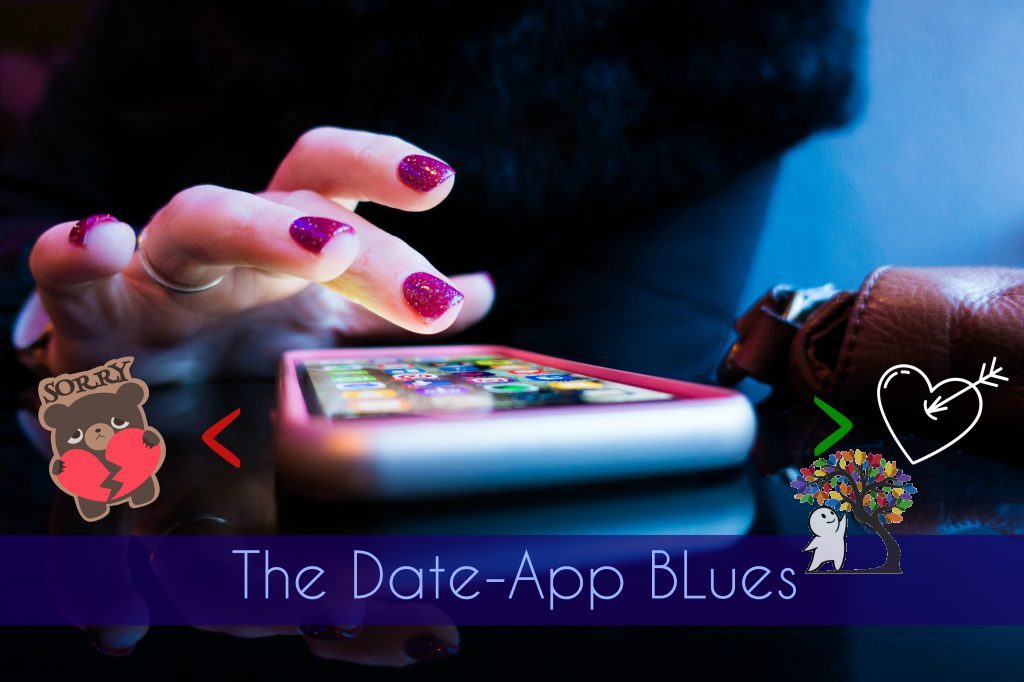The 4 Mental Effects Of Swipe-Dating Apps

A World of Swiping

It was in autumn of 2012 that our smartphone-addicted society was changed forever by the rise of the most infamous dating app known to humankind: Tinder. If you’re reading this article on your computer or phone, you know what Tinder is. But on the off chance that you’re not one of the 100 million people (and counting) who has downloaded the app at one time or another, allow me to explain.
Tinder is an app that allows one to view a person’s brief profile – consisting of up to six images and a short bio – and gives them the choice to either reject that profile by swiping left on it, or show interest by swiping right. Tinder is not the first of its kind, and it isn’t the last. An onslaught of similar swipe-apps have surfaced and are used by hundreds of millions of people today.
Fun and Simple

Before I continue any further, keep in mind: the purpose of this article is not to condemn or shame anyone who uses swipe-dating apps. I myself was a long-time user. I’m in a loving, healthy long-term relationship with someone I’ve met off of Tinder.
Swipe-apps can be fun. With apps like Tinder, you have a catalog of eligible dating options within the vicinity of your town or city, and you know right away who’s into you and who’s not. It’s right to the point, and you can do it while lying on your couch in sweatpants. The best thing about swipe-dating? There’s no shame in having an app on your phone. The embarrassment we used to feel when we used to say “I’m on a dating website” has disappeared – because who hasn’t tried their hand at swiping?
Unfortunately, swipe-apps do also have their cons. There are prices to pay for the speedy convenience of swiping left or right; swipe-apps take a huge toll on our mental health and emotional well-being over time. So what are these effects, specifically? I’ll tell you.
-
Swipe-Apps Are Extremely Addicting

“It’s fun, it’s like a game!” How many times have you heard someone say that as they squealed in excitement about their newest match? But it’s true. Swipe-apps dig into our basic evolutionary instincts, which push us to seek reward in the form of emotional arousal. Sound familiar, psychology majors? Yes, I’m talking about operant conditioning (B.F. Skinner in the house).
Our behavior can be encouraged by positive reinforcement. When someone swipes on a dating app they are given the positive “reward” of finding a match. Finding matches are fulfilling rewards; they tell us we are desirable, boosting our self-esteem. In response, the reward centers of our brains explode in rushes of dopamine, making us feel amazing. This feeling is great, but the burst of happiness we feel is short lived. So what do we do? We keep swiping through profiles until we can feel that reward response again. The excitement of a match always feels fresh to us because they are randomized – we never know when we will get another match. It might take 5 or 30 swipes to get another one, but the thrill of the hunt effects us either way.
Like a gambler at a slot machine, a swipe-app user could find themselves on their phone for hours, or until they run out of people to match. The easy access to these phone apps allows us to swipe compulsively everywhere we go. For many, swiping becomes a game instead of a search for love.
2. Real World Disappointment

Are you someone who takes the time to actually look at your match’s profile and all 6 of their uploaded pictures? Do you take the extra step to talk to your match for a solid week before meeting them in person? Me too. But finding love via phone app doesn’t just become easier for us because we’re careful.
According to researcher Tomas Chamorro-Premuzic, our online profiles are not accurate representations of who we are in real life – as a result, this takes a huge toll on the outcome of our swipe-app induced dates. In today’s digital age, we have the power to alter ourselves to be anything we want to be. With the power of suggestive wording and a few well-lit pictures, you can make yourself seem cooler, stylish, mysterious, well-spoken… the list goes on. This is not to say we all do this with ill intent. Everyone wants to put their best foot forward when it comes to curating our accounts and looking attractive and presentable online.
We match with someone, and we view their curated profile and wonder how they’re even single. Then we meet them in person and we’re smacked in the face with the sad reality. Spending more time with someone’s digital identity than their real-life identity can cause us to romanticize our own ideas of who they will be when we meet them in person. We enter the date with sky-high expectations and when we realize they are not who we’ve made them out to be, we lose interest.
The solution? Get off of Tinder as soon after you match as possible. Go out on a simple (cheap) date: coffee, a walk in a public park… and make a decision on the real face behind the match. Worst case, you aren’t a good fit for each other. But hey, it’s an hour of your life compared to the 1 or 2 weeks you may have spent getting your hopes up in a text conversation.
3. Lowered Self-Worth

A recent study on the effects of Tinder surveyed 1,300 college students on how they felt about themselves. The results of the survey showed that those in the survey group who used Tinder had significantly lower levels of self-worth. Many were unhappy with their looks and their bodies. They often monitored how they looked and compared their appearances to other people. Tinder users expressed higher importance for societal norms for beauty. Tinder users were also more likely to consider themselves as sexual objects.
But is this truly surprising? After all, rejection is a huge part of the swipe-app experience. A considerable amount of users only receive messages back from half of their matches. A portion of these messages is often crude or aggressive. This often incites people to start questioning their appearances and self-monitoring their messages.
Those who have the lowest self-esteem on apps like Tinder are men. According to researcher Trent Petrie, this result might be due to the face that Tinder allows men to be put in a position of judgment that women often find themselves in on the dating scene. Since women tend to be more selective than men – who tend to swipe right more often than women – it is possible that men are being rejected on these apps more often.
To many, these apps are platforms for validation. But Petrie warns, “… These platforms may not be the best place to get validation…We [should] look a little more inside ourselves, and to our close friends, for that validation.”
4. Trust Issues

Swipe-dating apps are a huge test of many people’s trust. Ending conversations suddenly and with no explanation, or “ghosting”, is extremely common on swipe-apps. One day you could be talking to someone you feel completely comfortable with, and the next, they’re gone. This can elicit fears and anxieties for the next in-app conversation they may have. One may begin to ask themselves, “will I be ghosted for another match?” or “is there something about my profile they didn’t like?” Behavior like this can lead people to become cynical and mistrusting of their dating pool.
This isn’t to say that ghosting can’t occur after a real-life date. It happens all the time. But in seeing someone face-to-face, non-verbal cues (like body language and tone) tell us how the date is really going, regardless of whatever is said.
Swipe-app trust issues can also bleed into new relationships. People who pair up after meeting on a swipe-app often experience trust issues that occur because of the app itself. In a new online culture plagued by dating choice, it is all too easy to download an app and start looking for new prospects whenever you feel the urge to. According to researcher Eric Klinenberg, this ease can also make it harder for us to be faithful to our partners. The ease and temptation of a dating app can make it hard for some of us to be committed to one partner. This can lead to paranoia and anxiety about our partners: Who are they texting? Am I the only person they’re seeing romantically? Do they still have Tinder on their phone? This mistrust, if not overcome, can end a relationship.
So Are Dating Apps Cancelled?
Well… Not really. Apps like these seem to be the direction modern society is taking romance in, whether we like it or not. This information can be a little scary. Swipe-dating apps do have the capacity to mess with your mental health and your overall happiness. But you don’t have to let them! Use them with an open mind, and know that you are not defined by other people’s thoughts and comments on you or your looks.
The first time I ever used Tinder, I felt very self-conscious. I often wished I had more matches, and I questioned my looks and my conversational skills as a result. I felt pressured into being more sexually available, when in reality, what I really wanted was a meaningful relationship. It took time for me to remember a few things:
- I am beautiful inside and out, and deserving of love.
- nothing was stopping me from being vocal about what my preferences were (so long as they weren’t harmful or offensive to others).
- If people weren’t interested in me, it was their loss.
I sound a little full of myself, I know. But in a harsh dating-world full of rejection, who else is gonna cheer you on!?
What did you think? Any crazy dating stories you’d like to share? Do you have any thoughts about app-dating? Psych2Go would like to hear from you! Please feel free to add to the conversation down below.
You can also contact the author directly at alexanderjnunez@live.ca
Works Cited
Ansari, Aziz, and Eric Klinenberg. Modern Romance. CNIB, 2016.
Chamorro-Premuzic, Tomas. “The Tinder Effect: Psychology of Dating in the Technosexual Era.” The Guardian, Guardian News and Media, 17 Jan. 2014, www.theguardian.com/media-network/media-network-blog/2014/jan/17/tinder-dating-psychology-technosexual.
“Love Me Tinder: A Psychological Perspective on Swiping.” Psychology In Action, www.psychologyinaction.org/psychology-in-action-1/2015/04/16/love-me-tinder-a-psychological-perspective-on-swiping.
Oaklander, Mandy. “What Dating Apps like Tinder Do To Self-Esteem.” Time, Time, 4 Aug. 2016, time.com/4439084/tinder-online-dating-self-esteem/.
“Tinder: Swiping Self Esteem?” American Psychological Association, American Psychological Association, www.apa.org/news/press/releases/2016/08/tinder-self-esteem.aspx.
Whitley, Robert. “What Is The Link Between Tinder And Mental Health?” HuffPost Canada, HuffPost Canada, 5 Jan. 2017, www.huffingtonpost.ca/robertwhitley/tinder-mental-health_b_13981416.html.
Edited by Viveca Shearin



[…] The 4 Mental Effects of Swipe-Dating Apps […]
[…] The 4 Mental Effects Of Swipe-Dating Apps […]
I am a guy and I can confirm #3 & #4
Great article. I don’t think people even realise the apps are making them feel this way.